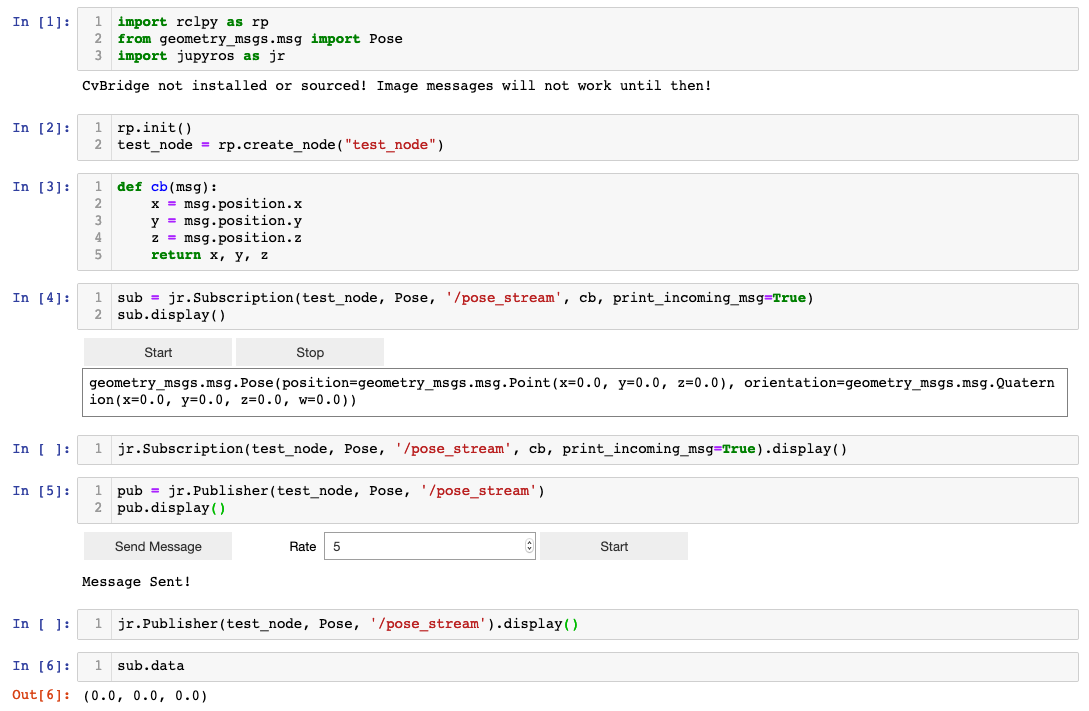This is a fork of the jupyter-ros project created by Wolf Vollprecht (@wolfv) for ros2.
While the Jupyter ecosystem has been widely adopted by the Data Science and Machine Learning community, the robotics community has not jumped on the band wagon yet! Most tools around ros2, the Next-Generation of the Robot Operating System, are built using Python and QT.
However, using QT seperates the user away from the code. We've built an initial version of the ros2 tools for jupyter notebook, trying to promote a rich, interactive experience for Robotics developers utilizing the power of the jupyter notebook.
With jupyter-ros2, it's possible to easily create widgets for custom message types to send messages.
In the future, we plan to bring simple and fast real-time plotting from ros2 topics to this library.
If you find this initial package useful, don't hesitate to contribute!
Though the orginal ROS project was capable of
running on Linux, using ros2 allows us to
expand support to all three major OSs': Linux, macOS, and Windows!
You need a ros2 environment with rclpy, obviously.
Also required are numpy and bqplot for the live-plotting
and ipywidgets for the interactive widgets
~$ python3 -m pip install jupyter bqplot pyyaml ipywidgets
~$ jupyter nbextension enable --py --sys-prefix ipywidgetspyyaml is necessary for rospy.
To install using pip:
~$ python3 -m pip install jupyros
~$ jupyter nbextension enable --py --sys-prefix jupyrosTo install the extension for jupyterlab, you also need to execute the following:
~$ jupyter labextension install jupyter-ros2For a development installation (requires npm),
~$ git clone https://github.com/zmk5/jupyter-ros2.git
~$ cd jupyter-ros2
~$ python3 -m pip install -e .
~$ jupyter nbextension install --py --symlink --sys-prefix jupyros2
~$ jupyter nbextension enable --py --sys-prefix jupyros2You might see a warning like "The rospy package is not found in your $PYTHONPATH. Subscribe and publish are not going to work. Do you need to activate your ROS environment?"
This is harmless during installation, but if you see this warning in a notebook, you should check that your ROS environment is activated. You can also set the path from inside the notebook using for Ubuntu 18.04:
import sys
sys.path.append('/opt/ros/dashing/lib/python3.6/site-packages/')
# The next line should now work!
import jupyrosIf you are using macOS, set the path to the directory where your source or binary ros2 installation is located as the following example:
import sys
sys.path.append('/Users/some_user/path_to_your_ros2_install/lib/python3.7/site-packages/')
# The next line should now work!
import jupyrosIf you got the following error when you run a cell failed to display Jupyter Widget of type VBox,
you can solve it by running the following command jupyter nbextension enable --py --sys-prefix widgetsnbextension
